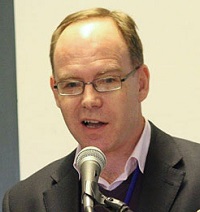“The gospel was, is, and always will be the only hope for Europe”
Every church should “identify what are the principal challenges in your city or town, for your neighbours, and for the young people down your street”, says church planter Jim Memory.
SEVILLE · 01 FEBRUARY 2016 · 18:28 CET

The church needs to understand how the gospel responds to the challenges facing society. The importance of connecting the Bible with the current affairs is one of the main priorities of the Evangelical organisations across Europe.
The Spanish Evangelical Alliance (Alianza Evangélica Española) will hold its annual Idea gathering, which will include talks, roundtables, and the general assembly.
One of the speakers during the weekend (19-21 February) is Jim Memory, church planter and lecturer at Redcliffe College (UK).
Memory responded to questions of Evangelical Focus.
Question. Jim, could you give us an idea of what you will be sharing in your plenary talk at Idea2016?
Answer. The title of my plenary will be “Our society, a place of opportunity for the gospel”. It is a fascinating topic because it confronts some of our unconscious attitudes as evangelicals about contemporary society: fear, contempt, hopelessness and many other negative feelings.
Much of this is due to our ideas about the “world”. Of course, there are many Bible texts which advise us “Do not love the world or anything in the world. If anyone loves the world, love for the Father is not in them” (1 John 2:15), or warn us that we should watch out for the “cares of the world and the deceitfulness of riches and the desires for other things” (Mark 4:19). But we shouldn’t forget that God loves the world and that “God did not send his Son into the world to condemn the world, but to save the world through him” (John 3:17).
However dark this world might be, Christ sends us into the world with a mission to fulfil: “You are the light of the world. A city set on a hill cannot be hidden; nor does anyone light a lamp and put it under a basket, but on the lampstand, and it gives light to all who are in the house. Let your light shine before men in such a way that they may see your good works, and glorify your Father who is in heaven” (Matthew 5:14-16). That is the mission that Christ has charged us with – the transformation of society, to bring light to our world.

A. The impact of secularism on contemporary society is clear to all, at least in the West. But on a global level, that is not the case. The world is not becoming more secular but more religious, as authors like Philip Jenkins have observed (Jenkins, The Next Christendom, Oxford: OUP, 2011). The extraordinary growth of the church in Africa, Asia and Latin America over the last fifty years means that the “typical Christian” is no longer an elderly European but a young woman living in a Brazilian favela.
I say that because the gospel continues to powerfully transform societies all around the world. We need to recover our confidence in the gospel which was, is, and always will be the only hope for Europe. Secularism has prospered in these years of peace, prosperity and social welfare provision, but it can never give answers to the deepest needs of the human heart. Opportunities there are, but the question is, are we prepared to take advantage of them?
Q. As churches in Spain, do we need to revise our understanding of mission?
A. Concepts about mission are changing. Until recently, for many churches, the word “mission” was associated with evangelistic campaigns or with the work of cross-cultural missionaries. It was seen as something that the church did in God’s name. More and more churches are beginning to understand that mission isn’t an activity of the church but an attribute of God. As Chris Wright puts it in his magnificent book, The Mission of God, “Mission is not ours; mission is God’s. It is not so much the case that God has a mission for His church in the world but that God has a church for His mission in the world.” (Wright, The Mission of God, Downers Grove: IVP, 2006, p.62)
That is paradigm changing both for the church and for every believer. Seen in this way, mission becomes the organizing principle of the church, the reason for the church’s existence and for each one of us individually too. It doesn’t remove the need for evangelistic campaigns or the sending of cross-cultural missionaries. Rather it makes every church and every believer an agent of God’s mission in the world.
That way of thinking has motivated the authors of Imagine which will be presented at Idea2016 and will be then be distributed to the churches of Spain. We want to contribute to this change of paradigm.
Q. What are the principal challenges for the advance of the gospel in contemporary society?
A. The society in which we live is complex and dynamic. The challenges for a church in the centre of Madrid are very different from those in a small rural town in Andalucía [Southern region of Spain], for example. Hence any attempt to sum up the challenges that the churches of Spain are facing into a single list would be a crude generalisation. However, I think it’s likely that immigration, unemployment, nationalism and Islam would enter into most people’s lists wherever you live in Spain.
There are challenges everywhere but every challenge is also an opportunity. So I would put the emphasis on two things. Firstly, that churches try and understand their immediate context better. In other words, to try and identify what are the principal challenges in your city or town, for your neighbours, and for the young people down your street. If we want to communicate the gospel in word and deed to our neighbours we need to understand them, listen to their concerns and comprehend their worldview.
And secondly, that we recover our love for the lost, for people, for the world that surrounds us – our world, our society. Mission was born in the love of God for the world. It was made visible in the love of Christ for the lost sheep, such love that he gave his life on the cross for our salvation. And now, by means of the Holy Spirit, God continues to express his love for the world through the church. As I said earlier: That is the mission that Christ has charged us with – the transformation of society, to bring light to our world.
Read Jim Memory’s articles about Church Planting in Europe.
Published in: Evangelical Focus - europe - “The gospel was, is, and always will be the only hope for Europe”
